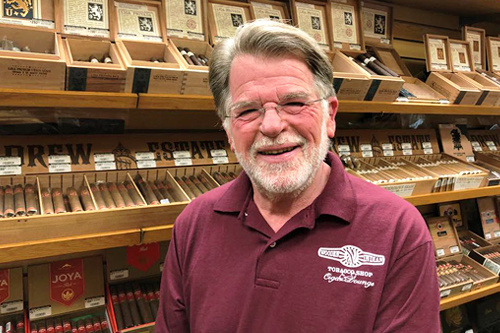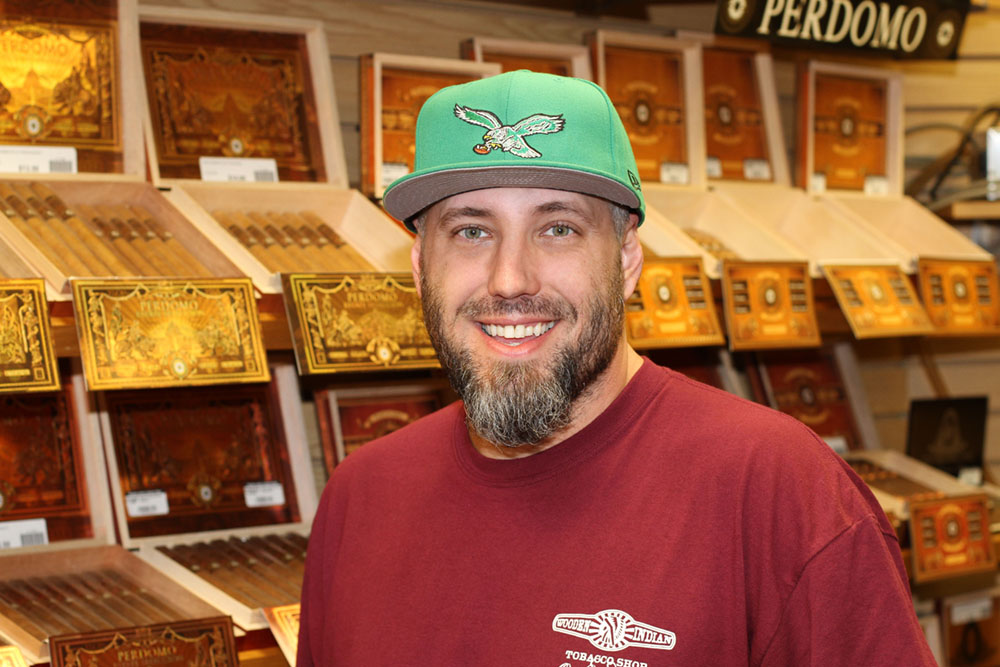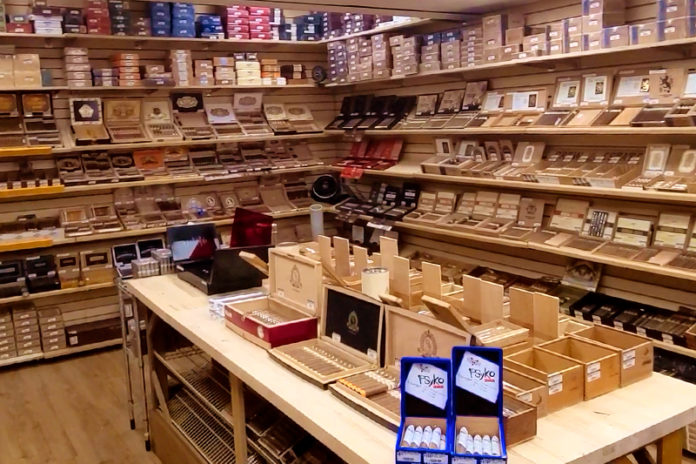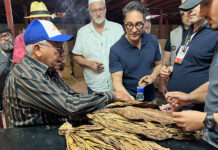Most tobacco retail stores begin as small boutiques, but if the market allows, they grow into much bigger operations. That was the case with Wooden Indian Tobacco Shop, which began not as a store but instead as a small table within an indoor Pennsylvania mall in 1959. A lot has changed since those days. Now, instead of a table and a cloth partition, Wooden Indian Tobacco Shop is a proper brick-and-mortar store. It has a 950-square-foot humidor and an 850-square-foot Drew Estate-branded lounge as well as a strong online presence.

What did it take for this store to make the leap from a small boutique to a thriving brick-and-mortar tobacco retailer? Simply put, a vision. In 2005, Dave Mayer had a choice to make. Was he going to enjoy a well-deserved retirement or would he take on the challenge of running a struggling cigar store? Like most people, Mayer found retirement and the freedom that came with it more than a little appealing. As many retirees encounter, the relaxation and downtime are enjoyable to a certain extent. However, he wanted more to do, a new challenge. It wasn’t until he spoke to the owner of his favorite cigar store that he discovered what his next chapter would be.
Mayer discovered that the owner wanted out. Up until that point, the only retail experience he had was from his teenage years when he worked in a drugstore. Some people may have been intimidated by the daunting task of what it would take to run a cigar store, but Mayer embraced the challenge and used it as motivation to build something great.
“When I took it over, the Wooden Indian Tobacco Shop was the ‘little engine that couldn’t’ of cigar stores,” Mayer states on his store’s website. “Like a locomotive needs coal to go uphill, a cigar store needs inventory to succeed. But the store at that time had just 123 open boxes of cigars, with very few popular brands represented.”
Mayer set out to revive the shop by giving its inventory a much-needed review. Within five years, the store’s humidor housed 587 boxes of premium cigars. As the inventory and selection improved, so did the customer base. By 2010, Wooden Indian Tobacco Shop had once again outgrown its space. Today, Wooden Indian Tobacco Shop’s humidor includes an eclectic assortment of brands, both big and small. Mayer also realized that the future success and growth of Wooden Indian Tobacco Shop would depend on having a team that not only helped him with the store’s operations but also shared in his vision. One of those team members is Dan Wood, general manager of Wooden Indian Tobacco Shop, who discusses his store’s journey from small boutique to big-time tobacconist status.
Glitz and Glamour
Wood smoked his first cigar in 2008. Soon after, he began traveling to many different tobacco stores and lounges across several states. One of those trips introduced him to Wooden Indian Tobacco Shop, where he became a member of the store’s Liga Privada lounge and met the store’s owner, Dave Mayer.

“I was a customer and lounge member for years,” says Wood. “When I hit a crossroads in my career at the time, I realized I needed to do something that brought me joy and happiness, and nothing did that more than cigars, so I approached Dave Mayer in early 2013 for an opportunity, and the rest was history.”
Wooden Indian Tobacco Shop had undergone several major transformations before Wood came on board. When it first opened in 1959, it was nothing more than a table separated from another business by a cloth partition within the Bazaar of All Nations shopping center located in Clifton Heights, Pennsylvania. After five years in that location, the shop officially changed its name to Wooden Indian Tobacco Shop and relocated to one of the first strip malls in America, the Manoa Shopping Center in Havertown, Pennsylvania. It remained in this location for 25 years. Once Mayer assumed control of the store, it grew even more, and like most successful tobacco retailers, it was understood that in order for the store to grow it would need more space. It moved to its current location at 95 S. Eagle Road in Havertown in 2010. The move allowed it to expand its humidor and open what would become the first Liga Privada lounge.
Each move was necessary for Wooden Indian Tobacco Shop to grow and better serve its customers. Providing locals with a place to comfortably smoke and relax was not only important to Mayer but helped make the business more important to its customers. Wooden Indian Tobacco Shop has resisted the urge to actively fight for dominance and notoriety among other tobacconists in the area and instead focused on customer experience to remain front of mind with its customers.
“So many businesses want to stand out as the first, the best, the only, when really it’s a matter of being your own shop’s personal best for the customer,” says Wood. “All the glitz and glamour fades when satisfaction in a service is poor or undesirable. Fortunately, there is such a brotherhood in this industry, especially in this area, that we all support and respect each other, which helps our individual businesses grow because of it.”
Another key factor in Wooden Indian Tobacco Shop’s approach to customer service is to go far beyond the goal of buying and selling. Instead, Wood and others at the store are more concerned with building relationships that are rooted in trust, knowledge and understanding. They work to communicate that each product in the store is more than just a transaction and instead is about an appreciation of the craftsmanship and love that goes into creating each cigar. That requires Wood and others on the team to listen and get to know the customers so that they can better guide them toward the products that will allow them to relax and enjoy the cigars and overall Wooden Indian Tobacco Shop experience. To grow in retail, you must fully understand a customer’s tastes and needs and consider what brought them to your store in the first place.
Just Be You
You can’t build a strong retail presence by trying to copy what others are doing. Authenticity is another key part of Wooden Indian Tobacco Shop’s growth strategy. Wood explains that his store’s best marketing tool is word of mouth. Having the shop’s customers boasting about the store, its products and its customer service to their friends creates a ripple effect that brings in new customers all the time. While traditional advertising has its perks and promoting the store through social media is also important for building brand awareness, nothing beats the power and value of word of mouth. The only way to convert your customers into brand ambassadors is for the store to understand and embrace what makes it unique.








